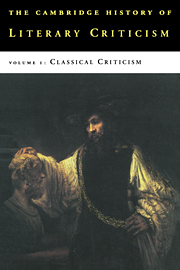Book contents
- Frontmatter
- 1 Early Greek views of poets and poetry
- 2 Language and meaning in archaic and classical Greece
- 3 Plato and poetry
- 4 Aristotle's poetics
- 5 The evolution of a theory of artistic prose
- 6 Hellenistic literary and philosophical scholarship
- 7 The growth of literature and criticism at Rome
- 8 Augustan Critics
- 9 Latin Criticism of the Early Empire
- 10 Greek Criticism of the Empire
- 11 Christianity and Criticism
- Bibliography
- Index
- References
2 - Language and meaning in archaic and classical Greece
Published online by Cambridge University Press: 28 March 2008
- Frontmatter
- 1 Early Greek views of poets and poetry
- 2 Language and meaning in archaic and classical Greece
- 3 Plato and poetry
- 4 Aristotle's poetics
- 5 The evolution of a theory of artistic prose
- 6 Hellenistic literary and philosophical scholarship
- 7 The growth of literature and criticism at Rome
- 8 Augustan Critics
- 9 Latin Criticism of the Early Empire
- 10 Greek Criticism of the Empire
- 11 Christianity and Criticism
- Bibliography
- Index
- References
Summary
Inherent in any literary criticism are assumptions about the nature of language and about what constitutes valid interpretation. This chapter will set out briefly what some Greek philosophers have to say on these and related subjects, but it should be recognised that we are often viewing their thought on the basis of modern assumptions about the implications of what they say, rather than entering into their own epistemic system. Until the fourth century BC we should probably grant that the Greeks saw language as a natural map of reality; they sought more often to understand reality with the tool of language than to try to understand the nature of language itself. Yet the discussion can provide a substratum of thinking which lies beneath the literary criticism of Aristophanes, Plato, and Aristotle, and a background for the discussion of the theories of Hellenistic philosophers in chapter 6, or for later Greek hermeneutics in chapters 10 and 11. Readers whose interests in criticism are not theoretical may, however, prefer to skip to chapter 3 and continue at this point with the applied literary criticism of Plato.
Early Greek hermeneutics
The Homeric poems already reveal a society grappling with interpretative problems. Nestor in Iliad 1 is represented as a wise old man whose insight, based on experience of situations and people, allows him to interpret and reconcile opposing views, and whose words ‘flowed sweeter than honey’ (249). Odysseus in both poems is astute and in the Odyssey often veils his thought, either as a form of self-protection or to test the attitudes of others.
- Type
- Chapter
- Information
- The Cambridge History of Literary Criticism , pp. 78 - 91Publisher: Cambridge University PressPrint publication year: 1990



